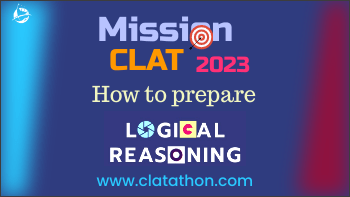As per the schedule, the CLAT 2023 will be conducted on 18 December 2022 across various exam centres in the country. Also, Common Law Admission Test for 2023 will be held for both undergraduate (UG) and postgraduate (PG) courses.
The Common Law Admission Test (CLAT) date for 2023 has been announced by the Consortium of National Law Universities. Those who are eligible and interested can register for the examination by visiting the official website - consortiumofnlus.ac.in.
The online registration process will begin soon, Aspirants are advised to keep following the official website of Consortium of NLUs to get more updates on the timetable and other details -consortiumofnlus.ac.in.
CLAT Eligibility Criteria 2023
CLAT 2023: Syllabus
Before starting your preparation, it is important for candidates to know the detailed CLAT Syllabus. It will help you know the difficult topics and easy topics as the point of the exam. Prepare a study plan as per the syllabus and start your preparation.
Check the detailed CLAT Syllabus and all the sections to be covered for comprehensive preparation.
1. English Language
2. Current Affairs/General Knowledge
3. Quantitative Techniques
4. Logical Reasoning
5. Legal Reasoning
|
English |
450 words each
|
Passages, Reading, Comprehension, Inference and Conclusion, Summary, Vocabulary etc. |
|
GK & Current Affairs |
450 words each
|
Contemporary Events of National and International Significance, Art and Culture, International Affairs, Historical Events of significance |
|
Legal Reasoning
|
450 words each
|
Rules and Passages of Law, Application of the rules and passages, etc. |
|
Logical Reasoning
|
300 words each
|
Argument – Premise and Conclusion, Inference, Relationships and Analogies, Contradictions and Equivalence, etc. |
|
Quantitative Techniques
|
- |
Basic Algebra, Mensuration, Statistical Estimation, Graphs, Numerical Information, Ratio and Proportion etc. |
Each section of the UG CLAT Paper will have you evaluating a passage of varying word counts and answering objective-type questions based on the passage.
Weightage of each subject
The UG-CLAT 2023 shall be a 2-hour test, with 150 multiple-choice questions carrying 1 mark each. There shall be a negative marking of 0.25 marks for every wrong answer. There must be conceptual clarity in the applicants regarding the questions asked in the paper and complete CLAT Exam Pattern.
|
Subjects |
No. of Questions |
|
English Language |
28-32 questions, |
|
Current Affairs, including General Knowledge |
35-39 questions |
|
Legal Reasoning |
35-39 questions |
|
Logical Reasoning |
28-32 questions |
|
Quantitative Techniques |
13-17 questions |
CLAT 2023 Preparation Tips: Logical Reasoning
The Logical Reasoning section of CLAT-UG which can be a bit time consuming. Although this section is considered tough by many, it is nothing but a myth. Aspirants can easily score good marks in this section with a lot of practice.
CLAT-UG Logical Reasoning Syllabus covers analytical and critical reasoning questions in current news and events. CLAT-UG Logical Reasoning questions are designed to test your comprehension, critical thinking, analysing patterns/arguments, identifying contradictions, drawing conclusions and reasoning skills. Aspirants must focus on improving their analytical skills, vocabulary and comprehension. You can easily ace this section with enough practice and understanding the theory concepts clearly.
We have curated the best CLAT Logical Reasoning Preparation Tips provided by our experts at CLATATHON (India’s Advanced Online Coaching Platform for CLAT Preparation) in this article.
Following these tips will enhance your skills of reasoning and logical thinking.
What are the Important Topics under CLAT-UG Logical Reasoning syllabus?
Before starting the preparation, it is important to get an idea about the complete CLAT-UG Syllabus from the exam point of view.
The syllabus for logical reasoning includes various questions based on verbal reasoning such as syllogism, analogies, logical sequence, blood relation, etc.
|
Arrangements |
Syllogisms |
|
Blood Relations |
Number Series |
|
Statements and Assumptions |
Logical Sequences |
|
Seating Arrangement/Puzzle Test |
Arguments & Conclusions |
|
Assertions and Reasoning |
Puzzles |
|
Circular Arrangements |
Direct sense |
|
Coding Decoding |
Analogies |
|
Clocks and calendars |
Connectives |
CLAT-UG Exam Pattern: Logical Reasoning
In the CLAT exam, about 28-32 questions will be asked from the logical reasoning section. The question shall include comprehension-based passages followed by 4-5 questions.
Given below is the exam pattern for CLAT-UG Logical Reasoning section:
|
Total Weightage |
20 % |
|
Type of Questions |
Objective type (Based on passages) |
|
Ability Tested |
Critical thinking, analysing patterns/arguments, identifying contradictions, drawing conclusions and reasoning skills |
|
Standard of Questions |
12th Standard |
|
Total Marks for Logical Reasoning |
28-32 |
|
Difficulty Level |
Easy to Moderate |
CLAT-UG: Preparation Books for Logical Reasoning
Books are an inherent source of knowledge while preparing for the CLAT. It is essential to seek the assistance of some books to enhance the knowledge and pass the examination.
We refer to the following CLAT Preparation Books while preparing for the exam.
Given below are the preparation books to study logical reasoning for CLAT:
|
Important CLAT Books for Logical Reasoning |
|
|
Universal’s Logical Reasoning for CLAT, LSAT and other Law Entrance Exams |
Jain Prateek |
|
Verbal and Non-Verbal Reasoning |
RS Agarwal |
|
A New Approach to Verbal and Analytical Reasoning |
Arihant’s |
|
Analytical and Logical Reasoning |
RS Agarwal |
|
Logical Reasoning |
RK Gupta and Samiksha Gupta |
|
Analytical Reasoning (English) |
MK Pandey |
|
501 Challenging Logical Reasoning Practice Book |
RS Agarwal |
|
A Modern Approach to Logical Reasoning |
RS Agarwal |
Also, check CLAT Books List
CLAT-UG Logical Reasoning Paper Analysis
Mentioned below is the analysis of CLAT-UG Logical Reasoning-
Solving previous year CLAT Papers will help candidates to know the type of questions asked in the exam, the difficulty level of the paper, marking scheme, etc. Candidates need to practice as many as sample papers in order to crack the exam easily. Previous year's papers are a great source when it comes to Logical Reasoning Preparation for CLAT.
CLAT 2022 Logical Reasoning was found to be lengthier than the previous year’s question paper.
CLAT 2022 Logical Reasoning consisted of a total of six passages and 30 multiple-choice questions.
CLAT-UG: Logical Reasoning Preparation Strategy?
Coming up with a preparation strategy for the section of CLAT-UG is extremely important for every law aspirant. Logical Reasoning is the most score-able section of CLAT, and a significant part of it depends on your approach.
You can consider below Preparation strategy for enhancing your logical reasoning preparation:
• Clear your concepts and understand the foundation of the topics from the logical reasoning syllabus. Also Identify your strengths and weaknesses
• Try to find one good book that will prepare you the best for the logical reasoning section instead of creating confusion with multiple books.
• Learn time management and easy techniques to solve logical reasoning questions. This will help you solve tricky questions quickly in the exam.
• Understanding of the real exam environment you need to attempt more mock tests along with Previous Year Question Papers, which gives you an idea of difficulty level of the section. So, find online Mock test preparation.
• Only practice can help you increase your speed and save time during the exam. Only with repeated practice can you excel in this section. So, maintain regularity and put extra effort on practice.
Read more: Short tricks to enhance your time management skills in CLAT
CLAT-UG Logical Reasoning: Preparation Tips
Logical Reasoning for CLAT tests the Aspirants reasoning abilities. Aspirants will be required to use critical thinking skills to analyse reasoning patterns and draw conclusions according to their assessments. Aspirants should be able to draw logical conclusions with effective arguments as required in the exam.
Given below are some preparation tips for Aspirants attempting logical reasoning for CLAT-UG:
Preparation Plan: The first step to studying logical reasoning is to make a detailed plan about studying the subject. Aspirants should make a list of topics and make plans to cover them on a daily basis so that they can complete the syllabus within the deadline and make time for revisions.
Practice: Logical reasoning section of CLAT will require Aspirants to practise a lot more to work on their analytical skills. Practising different methods of reasoning will help the Aspirants solve problems quickly.
Shortcuts Practise: Aspirants should practise using shortcuts and easier methods for solving problems. This method can be extremely useful when attempting to complete CLAT exam in a short time, which will help Aspirants manage their time.
Time Management: Aspirants should make sure that they manage their time appropriately when attempting to complete the exam. Taking too much time on one question will lead the Aspirants to not have time left for the other questions.
Easy to Hard: Aspirants should follow the easy to hard pattern when writing the exam. This means that Aspirants should first finish questions they find easier, after which they can attempt the harder problems.
Weaknesses and Strengths: Aspirants should early on make sure that they identify their strengths and weaknesses so that they can work on their weaknesses. Aspirants should make sure that when attempting the exam, they are well prepared for any situation at hand.
How to Attempt CLAT Logical Reasoning Questions?
There are several ways that you can attempt the Logical Reasoning questions of CLAT. Try to follow these quick CLAT Logical Reasoning tips to answer questions quickly:
- It is essential to recognize the conclusions and premises in a particular passage. These conclusions and assumptions make up the arguments. Identifying them will help you to proceed further.
- The next step is to determine the tone or theme of the passage. By checking the tonality, you can answer the questions that follow the passage.
- If you have successfully decoded the theme or the point of the passage, then it will be easy for you to choose the answers.
- It is also very essential to understand the view of the passage. It may have more than one view, which again can be contradictory. You must identify and segregate them. This will aid you in realizing if the passage has a central point or several viewpoints.
- Reading the question precisely is a skill that you have to enhance. You have to figure out the fine details and answer accordingly.
- The use of the word 'most' in the questions signifies that you have to pick an answer which best suits the question. It is essential to read without any distractions and pauses.
- It is essential to follow the question minutely and leave whatever prior knowledge you have of it behind. The question makers are well aware of this hesitation that might cross your mind. They are most likely intended to test your adapting skills and ability to soak in new facts and act accordingly without imposing previous knowledge.
A question regarding the implication of a particular statement in a passage may be given. In this case, two things need to be done. You have to assess what the statement implies explicitly as well inexplicitly.
For this, you have to assess and deduce all possible arguments of the statement for different views. Identification of the theme or the point will be beneficial while attempting these questions.
To get in touch, write to us at- ask@clatathon.com
Follw us 
![]()







